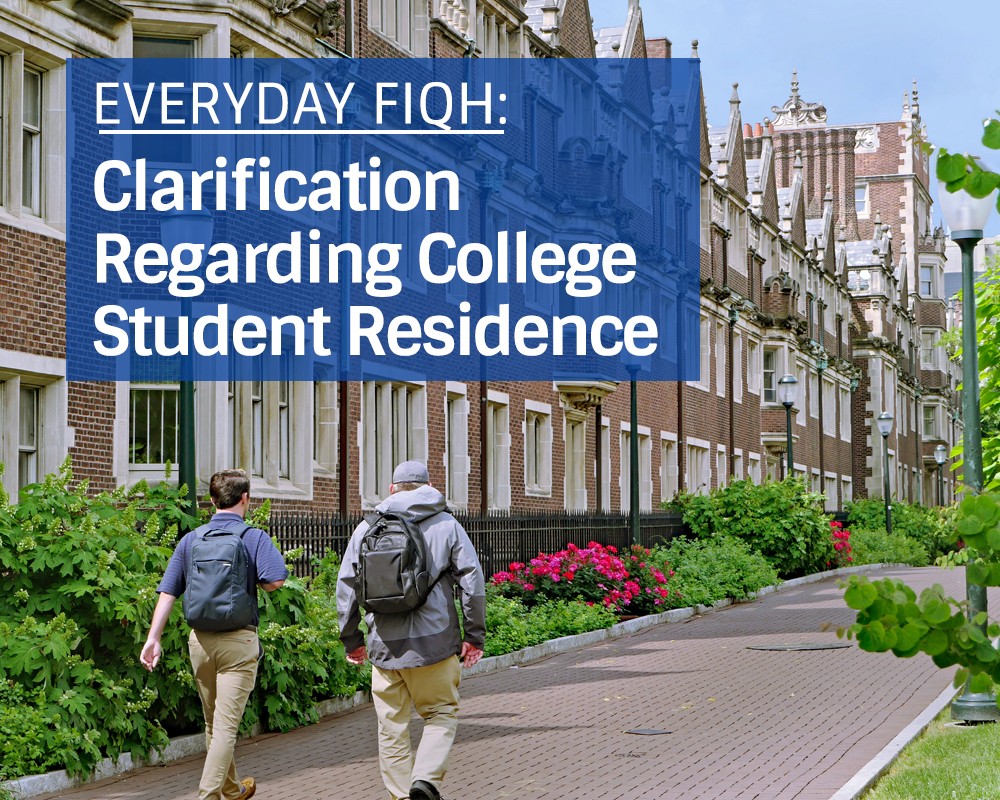Everyday Fiqh: Clarification Regarding College Student Residence
Clarification Regarding College Student Residence
According to the edicts of His Eminence Sayyid al-Sistani
تفصيل بخصوص استقرار وإقامة طلبة الجامعات

College and university students often ask jurisprudential questions about their fasting and four-unit prayers. This is because many of them move away from their hometowns or travel back and forth throughout the week for studies and in-person classes, which occur over many days and for several hours each day. Therefore, this clarification became necessary.
According to the rulings of long-term stay and the chart that details the criteria of frequent travel that were issued by the office of the Religious Authority, His Eminence Grand Ayatullah al-Sayyid al-Sistani (may God prolong his life), the place where an institute, college, or university student is working/studying is sometimes considered a long-term stay (LTS) and sometimes not. Moreover, based on the student’s commute, sometimes they may travel to the college/university and return to their family’s home daily, whereas in other cases, a student may travel on Monday mornings and return on Friday evenings. In addition, when taking the location of the university into consideration, sometimes it is at a place that is jurisprudentially “distant” in a one-way journey (i.e., more than twenty-seven miles away), and sometimes it is less than that (e.g., twenty-three miles) but more than fourteen miles away, such that the two-way trip (i.e., going and coming) would cover the jurisprudentially required distance. Therefore, there are eight different possibilities:
First case: The university is an LTS for the student’s occupation (e.g., studying); they travel there daily, and the campus is more than forty-four kilometers/twenty-seven miles away. Thus, the student should pray full prayers at the LTS, on the way to the university, and if they travel to a place other than the LTS. This is the case during their period of work there because they would be considered a frequent traveler. In the summer break, the student should continue to pray full prayers at the university because they have not abandoned the LTS altogether, and they should shorten their prayers on the way to the university and in any other travel, since frequent travel has ceased.
Second case: The university is an LTS for the student. It is less than forty-four km/twenty-seven mi but more than twenty-two km/fourteen mi away, so the student must pray full prayers at the LTS and on the way to the university during the school year, because they are not actually considered a traveler. This is because they do not travel the required jurisprudential distance and the LTS interrupts it. However, the student should shorten their prayers if they travel elsewhere, because they are not considered a frequent traveler. As for the summer break, the ruling is the same as during the school year.
Third case: The university is considered an LTS for the student’s occupation; they travel there on Sunday mornings and return to their family on Thursday evenings, and the distance between their family and the university is more than forty-four km/twenty-seven mi. The student should pray full prayers at the university and shorten them on the way there and if they travel to any place other than the LTS, because they are not considered frequent travelers. This is the rule throughout the school year and during the summer break.
Fourth case: The university is not considered an LTS for the student; the student travels there daily, and the distance between the university and their family’s home is more than forty-four km/twenty-seven mi. They should pray full wherever they travel because they are considered a frequent traveler. This is the case throughout the school year. However, during the summer break, they should shorten their prayers during all their travels, because they are no longer considered a frequent traveler [during that period].
Fifth case: This is the same situation as the previous case except that the distance is less than forty-four km/twenty-seven mi but more than twenty-two km/fourteen mi. Its rule is the same as the previous case.
Sixth case: The university is considered an LTS for the student’s occupation, and they travel there on Sunday mornings and return to their family on Thursday evenings, and the distance between their family’s home and the university is less than forty-four km/twenty-seven mi but more than twenty-two km/fourteen mi. The student should pray full prayers at the LTS and on the way there because the distance is jurisprudentially not long enough. They should shorten their prayers if they travel to a place other than the LTS during the school year, and the ruling is the same during summer break.
Seventh case: The university is not considered an LTS for the student’s occupation; they travel there on Sunday mornings and return to their family’s home on Thursday evenings, and the distance between the university and their family’s home is more than forty-four km/twenty-seven mi. The student should pray full prayers in all their travels because they are considered a frequent traveler, since they travel four trips a month, and each trip lasts five days. This rule applies during the school year, but during the summer break, they should shorten their prayers in all their travels since they do not qualify as a frequent traveler [during that period].
Eighth case: This is the same situation as the previous case with the exception that the distance is less than forty-four km/twenty-seven mi. The rule is the same as the previous case.
Note: The possibility that the place of study qualifies for a student as an LTS for their occupation is very unlikely because it does not meet the first assumption mentioned in the LTS chart, which is to remain there for more than twenty-two days every month, twenty-four hrs. for each day, for 1.5 years, or any other criteria mentioned in the chart.

Leave a Comment:
You must be logged in to post a comment.